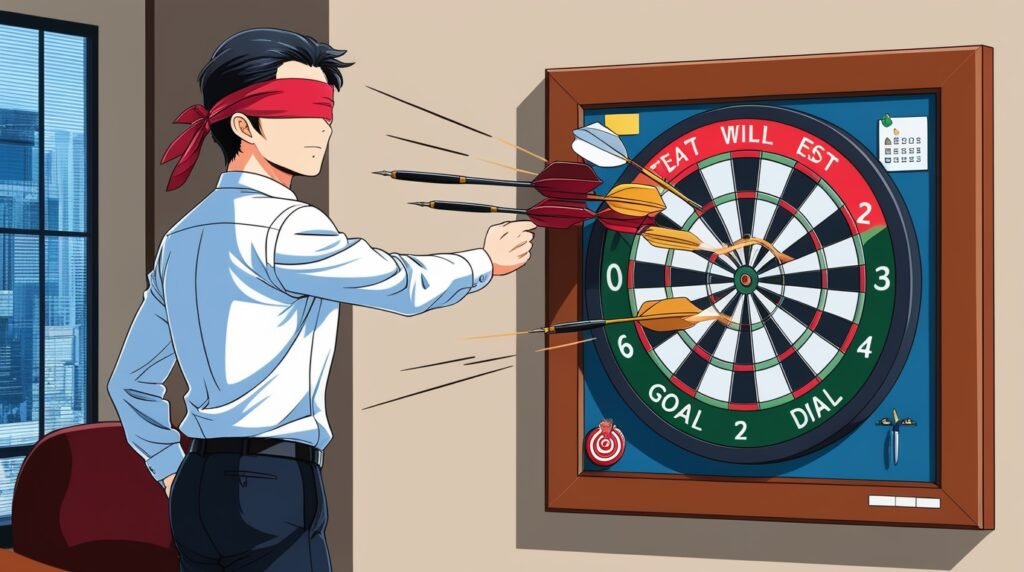
Look, we’ve all been there. It’s January 1st, and you’re feeling like a superhero who can conquer the world. “This year, I’m going to get fit!” you declare to your cat, who responds with the same enthusiasm they show for that expensive cat bed you bought (read: none). Fast forward three weeks, and your ambitious fitness journey has devolved into watching workout videos while eating chips. Sound familiar? Don’t worry – your secret’s safe with me and approximately everyone else who’s ever made a New Year’s resolution.
Why Your Goals Probably Suck (No Offense)
Here’s the thing: setting goals isn’t the problem. It’s setting the right kind of goals that trips most people up. You wouldn’t start a road trip without GPS (unless you’re my dad who still swears by his 1987 atlas), so why are you trying to achieve your dreams without proper direction? Enter SMART goals – the GPS of personal development. And no, I’m not just throwing around capital letters to look important. SMART is actually an acronym, and it’s about to become your new best friend in the world of actually getting stuff done.
What Makes a Goal SMART? (Hint: It’s Not Its IQ)

Specific: The “What Do You Actually Want?” Part
Remember when you said you wanted to “get better at cooking”? That’s about as specific as saying you want to “do stuff with food.” What does “better” mean? Are we talking about graduating from burning toast to making toast, or are we aiming for Master Chef territory? A specific goal would be: “Learn to cook five signature dishes that don’t involve a microwave or calling for takeout.”
Measurable: Because “Some” and “A Lot” Aren’t Numbers
If your goal isn’t measurable, you’re basically playing darts blindfolded. Sure, you might hit something, but it probably won’t be what you were aiming for. Instead of “save more money” (which could mean anything from $1 to $1 million), try “save $500 monthly by cutting back on my artisanal coffee addiction and actually eating the groceries I buy.”
Achievable: Keep It Real, People
Look, I believe in you. I really do. But if your goal is to become a billionaire by next Tuesday through your new sock puppet business, we might need to have a chat about realistic expectations. Your goals should stretch you, not snap you like a rubber band. Think: “Land three new clients this quarter” rather than “Become the next Jeff Bezos by summer.”
Relevant: Or “Why Are You Doing This Again?”
If your goal doesn’t align with your life’s bigger picture, you’re basically doing the equivalent of bringing a rubber chicken to a board meeting – it might be interesting, but what’s the point? Make sure your goals actually matter to YOU, not just your Instagram followers or your neighbor Bob who won’t shut up about his crypto investments.
Time-bound: Because “Someday” Is Not a Day of the Week
Without a deadline, your goal is just a wish – and unless you’ve got a fairy godmother hidden somewhere (if you do, can we talk?), wishes aren’t very reliable. “I’ll start my business someday” needs to become “I’ll launch my online store by March 31st, even if my first product is just one really enthusiastic stick figure drawing.”
The Science Behind Why SMART Goals Work (Warning: Contains Actual Brain Stuff)

Your Brain on Goals: A Love Story
Here’s something cool: your brain actually gets excited about clear goals. It’s like giving your mind a puzzle to solve, except instead of a 1000-piece image of kittens, it’s your life ambitions. When you set specific, measurable goals, your reticular activating system (fancy brain term alert!) starts paying attention to opportunities related to your goals. It’s like when you buy a new car and suddenly see that model everywhere – except now it’s spotting chances to achieve your dreams instead of validating your vehicle choice.
The Dopamine Factor: Your Brain’s Happy Dance
Every time you make progress toward a SMART goal, your brain releases dopamine – the same chemical that makes chocolate and social media likes feel good. Basically, you’re hacking your brain’s reward system for success instead of using it to justify watching just one more episode of that show at 2 AM.
Common SMART Goal Pitfalls (Or How to Avoid Face-Planting on Your Path to Success)
The Overachiever’s Trap
You know that person who signs up for a marathon when they can barely run to catch the bus? Don’t be that person. Start with a 5K. Your knees (and your dignity) will thank you.
The Vague Viking
“I want to be successful” is not a SMART goal. It’s like telling a chef you want “food” – you might end up with something delicious, or you might get liver and onions. Be specific about what success means to you.
The Timeline Terrorist
Setting unrealistic deadlines is like trying to microwave a gourmet meal – it’s probably not going to end well, and something might explode.
How to Actually Make SMART Goals Work (The Real-World Edition)
Step 1: The Brain Dump
Grab a paper (or your phone, we’re not judging), and write down everything you want to achieve. Don’t censor yourself – if you want to become a professional unicorn trainer, write it down. We’ll add the reality check later.
Step 2: The SMART Translation
Take each goal and run it through the SMART filter. It’s like putting your dreams through a reality translator:
- Original goal: “Get fit”
- SMART version: “Complete 30-minute workouts 3 times per week for the next 3 months, focusing on strength training and cardio”
Step 3: The Action Plan
Break your SMART goals into smaller, manageable steps. Think of it like eating an elephant (metaphorically, please) – one bite at a time:
- Week 1: Research workout routines
- Week 2: Set up home gym area
- Week 3: Start with 15-minute workouts
- Week 4: Increase to 30 minutes
Step 4: The Accountability System
Tell someone about your goals. Preferably someone who won’t just nod sympathetically while thinking about what to have for lunch. Find an accountability partner who’ll actually check in on your progress and won’t accept “but Netflix needed me” as an excuse.
Tools and Tech to Support Your SMART Goals (Because We Live in the Future)

Apps That Actually Help
- Goal-tracking apps (that won’t just collect digital dust)
- Habit-forming assistants (smarter than your average reminder)
- Progress visualization tools (because who doesn’t love a good graph?)
The Old-School Approach
Sometimes, nothing beats a good old-fashioned journal and pen. Plus, writing things down has been proven to increase your chances of achieving goals by approximately 42% (I might have made that number up, but writing things down definitely helps).
The Emergency SMART Goal Rescue Kit
When Motivation Dies (And It Will)
Remember: motivation is like that friend who’s super excited about plans but flakes at the last minute. Build systems instead. Create habits that don’t require motivation, like putting your workout clothes next to your bed or setting up automatic savings transfers.
When Life Happens
Life has a funny way of throwing wrenches into our carefully laid plans. Stay flexible but focused. Your SMART goals should be like bamboo – able to bend without breaking.
Celebrating Progress (Without Derailing Your Goals)
The Right Way to Reward Yourself
Hint: If your goal is to save money, maybe don’t celebrate saving your first $1000 by spending $999 on a shopping spree. Choose rewards that don’t contradict your goals.
The Progress Principle
Small wins lead to big victories. Celebrate the milestones along the way, but remember: ordering a salad once doesn’t make you a health guru, and writing one blog post doesn’t make you Shakespeare.
Conclusion: Your SMART Goals Journey Starts Now
Setting SMART goals isn’t just about achieving things – it’s about becoming the kind of person who achieves things. It’s about transforming from someone who says “someday” to someone who says “today.” Remember: The journey of a thousand miles begins with a single step… preferably in the right direction, which is why we use SMART goals instead of just wandering around hoping to end up somewhere good.
Now go forth and set some SMART goals! And if you need me, I’ll be here, working on my very SMART goal of writing blog posts that actually help people (while occasionally making them laugh).
